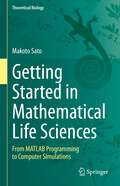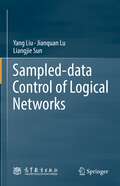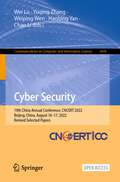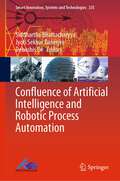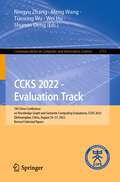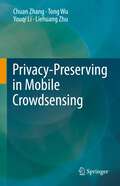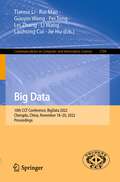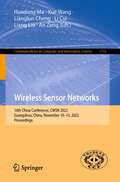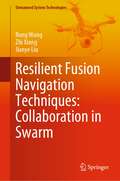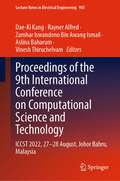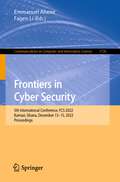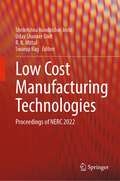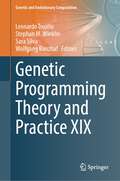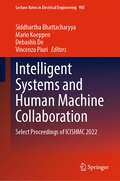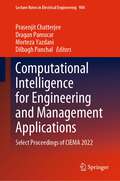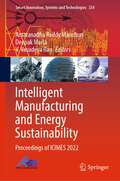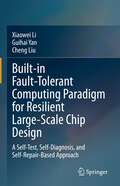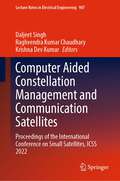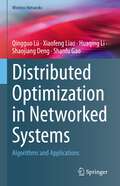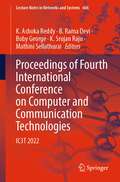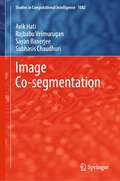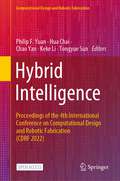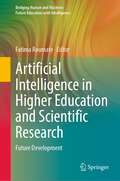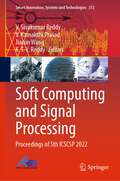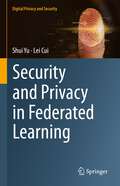- Table View
- List View
Getting Started in Mathematical Life Sciences: From MATLAB Programming to Computer Simulations (Theoretical Biology)
by Makoto SatoThis book helps the reader make use of the mathematical models of biological phenomena starting from the basics of programming and computer simulation. Computer simulations based on a mathematical model enable us to find a novel biological mechanism and predict an unknown biological phenomenon. Mathematical biology could further expand the progress of modern life sciences. Although many biologists are interested in mathematical biology, they do not have experience in mathematics and computer science. An educational course that combines biology, mathematics, and computer science is very rare to date. Published books for mathematical biology usually explain the theories of established mathematical models, but they do not provide a practical explanation for how to solve the differential equations included in the models, or to establish such a model that fits with a phenomenon of interest. MATLAB is an ideal programming platform for the beginners of computer science. This book starts from the very basics about how to write a programming code for MATLAB (or Octave), explains how to solve ordinary and partial differential equations, and how to apply mathematical models to various biological phenomena such as diabetes, infectious diseases, and heartbeats. Some of them are original models, newly developed for this book. Because MATLAB codes are embedded and explained throughout the book, it will be easy to catch up with the text. In the final chapter, the book focuses on the mathematical model of the proneural wave, a phenomenon that guarantees the sequential differentiation of neurons in the brain. This model was published as a paper from the author’s lab (Sato et al., PNAS 113, E5153, 2016), and was intensively explained in the book chapter “Notch Signaling in Embryology and Cancer”, published by Springer in 2020. This book provides the reader who has a biological background with invaluable opportunities to learn and practice mathematical biology.
Sampled-data Control of Logical Networks
by Yang Liu Jianquan Lu Liangjie SunThis book mainly focuses on the sampled-data control of logical networks. We believe that the methods (semi-tensor product of matrices), results (recent results on Boolean control networks under periodic sampled-data control, Boolean control networks under aperiodic sampled-data control, and logical control networks under event-triggered control) and topics (logical networks) in this book have become of particular interest to readers recently. Firstly, logical networks are of interest due to their rich range of applications in biology, game theory, coding, finite automata, graph theory, and other fields. Secondly, semi-tensor product of matrices offers a useful tool for formulating, analyzing and designing controllers for logical networks. Moreover, this book is the first to introduce sampled-data control into the study of logical control networks. All research results in this book are novel and worthy of further study. The book’s content is divided into three parts (Boolean control networks under periodic sampled-data control, Boolean control networks under aperiodic sampled-data control, and logical control networks under event-triggered control), which essentially progress from easier to more difficult. In addition, corresponding examples and diagrams are included in each section to facilitate understanding.
Cyber Security: 19th China Annual Conference, CNCERT 2022, Beijing, China, August 16–17, 2022, Revised Selected Papers (Communications in Computer and Information Science #1699)
by Wei Lu Yuqing Zhang Weiping Wen Hanbing Yan Chao LiThis open access book constitutes the refereed proceedings of the 18th China Annual Conference on Cyber Security, CNCERT 2022, held in Beijing, China, in August 2022. The 17 papers presented were carefully reviewed and selected from 64 submissions. The papers are organized according to the following topical sections: data security; anomaly detection; cryptocurrency; information security; vulnerabilities; mobile internet; threat intelligence; text recognition.
Confluence of Artificial Intelligence and Robotic Process Automation (Smart Innovation, Systems and Technologies #335)
by Siddhartha Bhattacharyya Jyoti Sekhar Banerjee Debashis DeThis book provides a detailed insight into Robotic Process Automation (RPA) technologies linked with AI that will help organizations implement Industry 4.0 procedures. RPA tools enhance their functionality by incorporating AI objectives, such as use of artificial neural network algorithms, text mining techniques, and natural language processing techniques for information extraction and the subsequent process of optimization and forecasting scenarios for the purpose of improving an organization's operational and business processes. The target readers of this book are researchers, professors, graduate students, scientists, policymakers, professionals, and developers working in the IT and ITeS sectors, i.e. people who are working on emerging technologies. This book also provides insights and decision support tools necessary for executives concerned with different industrial and organizational automation-centric jobs, knowledge dissemination, information, and policy development for automation in different educational, government, and non-government organizations. This book is of special interest to college and university educators who teach AI, machine learning, blockchain, business intelligence, cognitive intelligence, and brain intelligence courses in different capacities.
CCKS 2022 - Evaluation Track: 7th China Conference on Knowledge Graph and Semantic Computing Evaluations, CCKS 2022, Qinhuangdao, China, August 24–27, 2022, Revised Selected Papers (Communications in Computer and Information Science #1711)
by Ningyu Zhang Meng Wang Tianxing Wu Wei Hu Shumin DengThis book constitutes the refereed proceedings of the 7th China Conference on Knowledge Graph and Semantic Computing Evaluations, CCKS 2022, which took place in Qinhuangdao, China, in August 2022. The 25 full papers presented in this volume were carefully reviewed and selected from 42 submissions. CCKS technology evaluation track aims to provide researchers with platforms and resources for testing knowledge and semantic computing technologies, algorithms and systems, promote the technical development in the field of domestic knowledge, and the integration of academic achievements and industrial needs.
Privacy-Preserving in Mobile Crowdsensing
by Chuan Zhang Tong Wu Youqi Li Liehuang ZhuMobile crowdsensing is a new sensing paradigm that utilizes the intelligence of a crowd of individuals to collect data for mobile purposes by using their portable devices, such as smartphones and wearable devices. Commonly, individuals are incentivized to collect data to fulfill a crowdsensing task released by a data requester. This “sensing as a service” elaborates our knowledge of the physical world by opening up a new door of data collection and analysis. However, with the expansion of mobile crowdsensing, privacy issues urgently need to be solved. In this book, we discuss the research background and current research process of privacy protection in mobile crowdsensing. In the first chapter, the background, system model, and threat model of mobile crowdsensing are introduced. The second chapter discusses the current techniques to protect user privacy in mobile crowdsensing. Chapter three introduces the privacy-preserving content-based task allocation scheme. Chapter four further introduces the privacy-preserving location-based task scheme. Chapter five presents the scheme of privacy-preserving truth discovery with truth transparency. Chapter six proposes the scheme of privacy-preserving truth discovery with truth hiding. Chapter seven summarizes this monograph and proposes future research directions. In summary, this book introduces the following techniques in mobile crowdsensing: 1) describe a randomizable matrix-based task-matching method to protect task privacy and enable secure content-based task allocation; 2) describe a multi-clouds randomizable matrix-based task-matching method to protect location privacy and enable secure arbitrary range queries; and 3) describe privacy-preserving truth discovery methods to support efficient and secure truth discovery. These techniques are vital to the rapid development of privacy-preserving in mobile crowdsensing.
Big Data: 10th CCF Conference, BigData 2022, Chengdu, China, November 18–20, 2022, Proceedings (Communications in Computer and Information Science #1709)
by Tianrui Li Rui Mao Guoyin Wang Fei Teng Lei Zhang Li Wang Laizhong Cui Jie HuThis book constitutes the refereed proceedings of the 10th CCF Conference on BigData 2022, which took place in Chengdu, China, in November 2022. The 8 full papers presented in this volume were carefully reviewed and selected from 28 submissions. The topics of accepted papers include theories and methods of data science, algorithms and applications of big data.
Wireless Sensor Networks: 16th China Conference, CWSN 2022, Guangzhou, China, November 10–13, 2022, Proceedings (Communications in Computer and Information Science #1715)
by Huadong Ma Xue Wang Lianglun Cheng Li Cui Liang Liu An ZengThis book constitutes the refereed proceedings of the 16th China Conference on Wireless Sensor Networks, CWSN 2022, which took place in Guangzhou, China, in November 2022. The 17 full papers presented in this volume were carefully reviewed and selected from 204 submissions, including 87 English papers and 117 Chinese papers. The conference provided an academic exchange of research and a development forum for IoT researchers, developers, enterprises, and users. Exchanging results and experience of research and applications in IoT, and discussing the key challenges and research hotspots, is the main goal of the forum. As a high-level forum for the design, implementation, and application of IoT, the conference promoted the exchange and application of the oriesand technologies of IoT-related topics.
Resilient Fusion Navigation Techniques: Collaboration in Swarm (Unmanned System Technologies)
by Rong Wang Zhi Xiong Jianye LiuThis book describes the resilient navigation techniques under the background of collaboration in swarm. The significance of this work is that it focuses on the navigation enhancement by collaboration in swarm rather than ground infrastructure, which exploit potentialities of swarm in GNSS restricted environment. Although unmanned swarm is receiving greater attention, both through theoretical research and through increasing mention in the industrial developments, the navigation promotion by effective and efficient collaboration remains largely unexplored. While my scholarly work has explored some of the modeling, error characteristic, fusion algorithm, fault detection, and isolation aspects of the “adaptive navigation system” (such as the navigation system of robots and ground vehicles, aircrafts, aerospace vehicles, and unmanned aerial vehicles), the present book proposes the specialized investigation on the navigation with the resilient character, which could maintain the performance by essential collaboration with members in swarm in GNSS degradation environment. This book focused on the resilient navigation techniques under the background of collaboration in swarm. The key techniques of collaborative resilient navigation are proposed, including the collaboration framework, collaborative observation modeling, geometry optimization, integrity augmentation, and fault detection. The experiments are also carried out to validate the effectiveness of the corresponding techniques.
Proceedings of the 9th International Conference on Computational Science and Technology: ICCST 2022, 27–28 August, Johor Bahru, Malaysia (Lecture Notes in Electrical Engineering #983)
by Dae-Ki Kang Rayner Alfred Zamhar Iswandono Bin Awang Ismail Aslina Baharum Vinesh ThiruchelvamThis book gathers the proceedings of the 9th International Conference on Computational Science and Technology (ICCST 2022), held in Johor Bahru, Malaysia, on August 27–28, 2022. The respective contributions offer practitioners and researchers a range of new computational techniques and solutions, identify emerging issues, and outline future research directions, while also showing them how to apply the latest large-scale, high-performance computational methods.
Frontiers in Cyber Security: 5th International Conference, FCS 2022, Kumasi, Ghana, December 13–15, 2022, Proceedings (Communications in Computer and Information Science #1726)
by Emmanuel Ahene Fagen LiThis book constitutes the refereed proceedings of the 5th International Conference on Frontiers in Cyber Security, FCS 2022, held in Kumasi, Ghana, during December 13–15, 2022. The 26 full papers were included in this book were carefully reviewed and selected from 65 submissions. They were organized in topical sections as follows: ioT Security; artificial intelligence and cyber security; blockchain technology and application; cryptography; database security; quantum cryptography; and network security.
Low Cost Manufacturing Technologies: Proceedings of NERC 2022
by Shrikrishna Nandkishor Joshi Uday Shanker Dixit R. K. Mittal Swarup BagThis book is on various advanced, simple, and novel techniques being used and developed in the area of manufacturing processes. Manufacturing sector is one of the important areas which help to improve the economy of our nation. It not only generates employment opportunities but also makes us self-reliant (aatma nirbhar). In line with this important agenda of Government of India, this track envisages high-quality research contributions in the field of low-cost manufacturing technologies. It comprises the research and development studies on the various factors that influence the cost of manufacturing of product or system. The factors are materials, manufacturing processes, material handling processes, skilled manpower, quality control technologies, effective communication, and use of artificial intelligence techniques. The papers are on both numerical and experimental research works related to these aspects.
Genetic Programming Theory and Practice XIX (Genetic and Evolutionary Computation)
by Leonardo Trujillo Stephan M. Winkler Sara Silva Wolfgang BanzhafThis book brings together some of the most impactful researchers in the field of Genetic Programming (GP), each one working on unique and interesting intersections of theoretical development and practical applications of this evolutionary-based machine learning paradigm. Topics of particular interest for this year´s book include powerful modeling techniques through GP-based symbolic regression, novel selection mechanisms that help guide the evolutionary process, modular approaches to GP, and applications in cybersecurity, biomedicine and program synthesis, as well as papers by practitioner of GP that focus on usability and real-world results. In summary, readers will get a glimpse of the current state of the art in GP research.
Intelligent Systems and Human Machine Collaboration: Select Proceedings of ICISHMC 2022 (Lecture Notes in Electrical Engineering #985)
by Siddhartha Bhattacharyya Mario Koeppen Debashis De Vincenzo PiuriThe book constitutes proceedings of the International Conference on Intelligent Systems and Human-Machine Collaboration 2022. The papers consist of research from different domains of human-machine interaction, computer engineering like quantum computational intelligence, big data analytics, the Internet of things, etc. The book includes significant contributions from academia and industry dealing with human-machine interaction both from the theoretical development and the application point of view. It also brings out research articles in interdisciplinary platforms applying human-machine interaction. The book is useful to researchers and practitioners alike.
Computational Intelligence for Engineering and Management Applications: Select Proceedings of CIEMA 2022 (Lecture Notes in Electrical Engineering #984)
by Prasenjit Chatterjee Dragan Pamucar Morteza Yazdani Dilbagh PanchalThis book comprises select proceedings of the 1st International Conference on Computational Intelligence for Engineering and Management Applications (CIEMA - 2022). This book emphasizes applications of computational intelligence including machine intelligence, data analytics, and optimization algorithms for solving fundamental and advanced engineering and management problems. This book serves as a valuable resource for researchers, industry professionals, academicians, and doctoral scholars in engineering, production, thermal, materials, design, computer engineering, natural sciences, and management who work on computational intelligence. The book also serves researchers who are willing to use computational intelligence algorithms in real-time applications.
Intelligent Manufacturing and Energy Sustainability: Proceedings of ICIMES 2022 (Smart Innovation, Systems and Technologies #334)
by Amaranadha Reddy Manchuri Deepak Marla V. Vasudeva RaoThis book includes best selected, high-quality research papers presented at the International Conference on Intelligent Manufacturing and Energy Sustainability (ICIMES 2022) held at the Department of Mechanical Engineering, Malla Reddy College of Engineering & Technology (MRCET), Maisammaguda, Hyderabad, India, during June 24–25, 2022. It covers topics in the areas of automation, manufacturing technology, and energy sustainability and also includes original works in the intelligent systems, manufacturing, mechanical, electrical, aeronautical, materials, automobile, bioenergy, and energy sustainability.
Built-in Fault-Tolerant Computing Paradigm for Resilient Large-Scale Chip Design: A Self-Test, Self-Diagnosis, and Self-Repair-Based Approach
by Xiaowei Li Guihai Yan Cheng LiuWith the end of Dennard scaling and Moore’s law, IC chips, especially large-scale ones, now face more reliability challenges, and reliability has become one of the mainstay merits of VLSI designs. In this context, this book presents a built-in on-chip fault-tolerant computing paradigm that seeks to combine fault detection, fault diagnosis, and error recovery in large-scale VLSI design in a unified manner so as to minimize resource overhead and performance penalties. Following this computing paradigm, we propose a holistic solution based on three key components: self-test, self-diagnosis and self-repair, or “3S” for short. We then explore the use of 3S for general IC designs, general-purpose processors, network-on-chip (NoC) and deep learning accelerators, and present prototypes to demonstrate how 3S responds to in-field silicon degradation and recovery under various runtime faults caused by aging, process variations, or radical particles. Moreover, we demonstrate that 3S not only offers a powerful backbone for various on-chip fault-tolerant designs and implementations, but also has farther-reaching implications such as maintaining graceful performance degradation, mitigating the impact of verification blind spots, and improving chip yield. This book is the outcome of extensive fault-tolerant computing research pursued at the State Key Lab of Processors, Institute of Computing Technology, Chinese Academy of Sciences over the past decade. The proposed built-in on-chip fault-tolerant computing paradigm has been verified in a broad range of scenarios, from small processors in satellite computers to large processors in HPCs. Hopefully, it will provide an alternative yet effective solution to the growing reliability challenges for large-scale VLSI designs.
Computer Aided Constellation Management and Communication Satellites: Proceedings of the International Conference on Small Satellites, ICSS 2022 (Lecture Notes in Electrical Engineering #987)
by Krishna Dev Kumar Daljeet Singh Raghavendra Kumar ChaudharyThis book comprises the select proceedings of the International Conference on Small Satellites and its Applications (ICSS) 2022. It aims to provide a comprehensive and broad-spectrum picture of the state-of-the-art research, development, and commercial perspective of various discoveries conducted in the real-world smart small satellites, applications, and their services. The contents of this book focus on efficient power management systems, application-based optimum payload designs, telemetry and telecom and advanced navigation and RF systems, flight and ground software, structure, mechanism and materials, spacecraft autonomy, quality, testing and reliability for designing the small satellites through advanced computational procedures for a variety of applications, etc. This book proves to be a valuable resource for those in academia and industry.dgdg
Distributed Optimization in Networked Systems: Algorithms and Applications (Wireless Networks)
by Qingguo Lü Xiaofeng Liao Huaqing Li Shaojiang Deng Shanfu GaoThis book focuses on improving the performance (convergence rate, communication efficiency, computational efficiency, etc.) of algorithms in the context of distributed optimization in networked systems and their successful application to real-world applications (smart grids and online learning). Readers may be particularly interested in the sections on consensus protocols, optimization skills, accelerated mechanisms, event-triggered strategies, variance-reduction communication techniques, etc., in connection with distributed optimization in various networked systems. This book offers a valuable reference guide for researchers in distributed optimization and for senior undergraduate and graduate students alike.
Proceedings of Fourth International Conference on Computer and Communication Technologies: IC3T 2022 (Lecture Notes in Networks and Systems #606)
by K. Ashoka Reddy B. Rama Devi Boby George K. Srujan Raju Mathini SellathuraiThe book is a compilation of high-quality scientific papers presented at the 4th International Conference on Computer & Communication Technologies (IC3T 2022). The book covers cutting-edge technologies and applications of soft computing, artificial intelligence and communication. In addition, a variety of further topics are discussed, which include data mining, machine intelligence, fuzzy computing, sensor networks, signal and image processing, human-computer interaction, and web intelligence.
Image Co-segmentation (Studies in Computational Intelligence #1082)
by Avik Hati Rajbabu Velmurugan Sayan Banerjee Subhasis ChaudhuriThis book presents and analyzes methods to perform image co-segmentation. In this book, the authors describe efficient solutions to this problem ensuring robustness and accuracy, and provide theoretical analysis for the same. Six different methods for image co-segmentation are presented. These methods use concepts from statistical mode detection, subgraph matching, latent class graph, region growing, graph CNN, conditional encoder–decoder network, meta-learning, conditional variational encoder–decoder, and attention mechanisms. The authors have included several block diagrams and illustrative examples for the ease of readers. This book is a highly useful resource to researchers and academicians not only in the specific area of image co-segmentation but also in related areas of image processing, graph neural networks, statistical learning, and few-shot learning.
Hybrid Intelligence: Proceedings of the 4th International Conference on Computational Design and Robotic Fabrication (CDRF 2022) (Computational Design and Robotic Fabrication)
by Philip F. Yuan Hua Chai Chao Yan Keke Li Tongyue SunThis open access book is a compilation of selected papers from DigitalFUTURES 2022—The 4th International Conference on Computational Design and Robotic Fabrication (CDRF 2022). The work focuses on novel techniques for computational design and robotic fabrication. The contents make valuable contributions to academic researchers, designers, and engineers in the industry. As well, readers encounter new ideas about intelligence in architecture.
Artificial Intelligence in Higher Education and Scientific Research: Future Development (Bridging Human and Machine: Future Education with Intelligence)
by Fatima RoumateThis book explains the interaction between artificial intelligence and higher education. It explores artificial intelligence’s tangible and intangible impact on higher education and scientific research and discusses how higher education and scientific research enhance the progress of artificial intelligence technologies. Based on systematic analysis with a multidisciplinary approach and a combination of theory and practice, the book brings original perspectives from the massive use of artificial intelligence in higher education and scientific research since the appearance of COVID-19. This book also discusses ethics in artificial intelligence, taking into consideration the recommendation on ethics of artificial intelligence adopted by UNESCO. This book explains the importance of technological sovereignty and new strategies to face current and future challenges related to e-learning, deep learning, and machine learning.
Soft Computing and Signal Processing: Proceedings of 5th ICSCSP 2022 (Smart Innovation, Systems and Technologies #313)
by V. Sivakumar Reddy V. Kamakshi Prasad Jiacun Wang K. T. V. ReddyThis book presents selected research papers on current developments in the fields of soft computing and signal processing from the Fifth International Conference on Soft Computing and Signal Processing (ICSCSP 2022). The book covers topics such as soft sets, rough sets, fuzzy logic, neural networks, genetic algorithms and machine learning and discusses various aspects of these topics, e.g., technological considerations, product implementation and application issues.
Security and Privacy in Federated Learning (Digital Privacy and Security)
by Shui Yu Lei CuiIn this book, the authors highlight the latest research findings on the security and privacy of federated learning systems. The main attacks and counterattacks in this booming field are presented to readers in connection with inference, poisoning, generative adversarial networks, differential privacy, secure multi-party computation, homomorphic encryption, and shuffle, respectively. The book offers an essential overview for researchers who are new to the field, while also equipping them to explore this “uncharted territory.” For each topic, the authors first present the key concepts, followed by the most important issues and solutions, with appropriate references for further reading. The book is self-contained, and all chapters can be read independently. It offers a valuable resource for master’s students, upper undergraduates, Ph.D. students, and practicing engineers alike.
